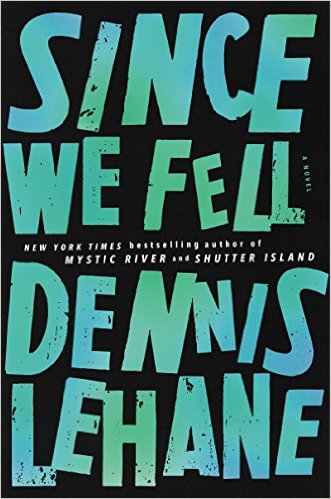Since We Fell
by Dennis Lehane
reviewed by Erik Hage
Dennis Lehane is primarily known for two things: his books make great movies (Mystic River, Gone Baby Gone, Shutter Island), and he most often writes about his native Boston, a city that has given him an ample landscape for taut, suspenseful novels. (He was raised by Irish immigrants in Dorchester.) While undoubtedly a regionalist, his true métier is oppressive human suffering, which he often renders with paradoxical beauty. In the opening moments of his latest book, Since We Fell, a shot man mouths words of love: “Wild, helpless, pure. Blooming and splattering in tandem with the blood on his shirt. … And then he fell off the boat and vanished beneath the dark water.”
Since We Fell is not merely a canvas for gratuitous violence or a pulp commercial thriller, however, but an agonizing psychological study in resilience, rendered through Rachel Childs, Lehane’s first woman protagonist. Rachel is a Boston journalist who covers Haiti in the wake of the earthquake, bearing close witness to the worst kinds of depredation and human brutality. Moreover, she is scarred by early wounds: her famous psychologist mother cruelly inflicts her own baggage upon her daughter, and Rachel’s father disappears soon after her birth. Her investigation into her father’s identity propels the early stages of the novel; however, an on-air meltdown in Haiti and a YouTube-generation public shaming over the incident send Rachel into a state of acute anxiety and agoraphobia. She becomes trapped in a Boston apartment, afraid of an outside world that “came at her like a storm cloud. Encircled her … It sucked her up into its swirl, spun her, and then spit her out of its maelstrom.”
This presages a shift from an attentively drawn-out psychological study to a refracted, tense, Hitchcockian atmosphere. Rachel, utterly alone, begins to suspect that the person with whom she shares her only remaining human bond, her husband, is leading a secret life, and her nose for investigation leads her into a deadly scenario. Lehane creates gripping circumstances out of oppositional tensions, with his protagonist’s agoraphobia twisting against her survivor instincts. This enables the Hitchcock flourishes: both on the hunt and being chased, she spies herself in urban windows and sees “a dozen Rachels reflected and re-reflected in the panes. They formed a disjointed ribbon, like a chain of Rachel dolls cut from construction paper. When she rounded the corner, they all took flight.” When the slow-building tension and anxiety burst open, and the plot becomes lightning quick, Lehane finds his zone. The frequent violence becomes somewhat gratuitous but oddly graceful in description.
In this way, he calls to mind Cormac McCarthy, yet he has little of that Pulitzer Prize winner’s thorny complexities and philosophical probings. In fact, for those who wring their hands over the lines between commercial fiction and more “literary” works, Lehane can be troubling—an elegant writer of mystery and thrillers who is not so easily tossed into the pulp pile. Like Hitchcock, whose influence is all over Since We Fell, Lehane is a master of story infrastructure and stylized moments. He does hit sour notes, though, instances that ring hokey and hollow, like stagy scenes in a noir film. For example, an older woman is answering Rachel’s questions with a cigarette in hand: “She lit it and exhaled and followed the smoke with her gaze. ‘He liked those [TV] shows because things made sense back then, you know? World made sense.’ … She looked around the empty park. ‘Not like now.’” With this novel, however, it’s best not to consider the individual moving parts, but the whole thing in motion.
These imperfections don’t much dim an appreciation of Lehane’s mastery, though. Let’s not forget that the radical filmmakers of France’s New Wave in the 1960s, most prominently François Truffaut, raised the perception of Alfred Hitchcock from mere crafter of popular movies to auteur and artist. Similarly, there is something distinct and auteur-like in Lehane’s hardboiler, framed moments that force the reader into new ways of seeing. For example, Rachel, like many survivors of abuse, is a scrupulous and frequent studier of faces, which mirror her inner life: “The child stared back at her with her mother’s eyes—so clear and untainted by skepticism or irony that Rachel couldn’t help but feel judged by them.” Since We Fell, in other words, rewards the more critical reader, but it is also movie-ready—in fact, the Hollywood rights were sold long before publication.
Published on August 14, 2017

